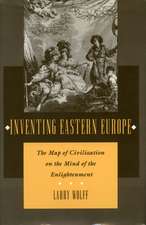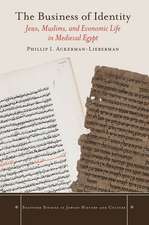Money, Power, and Influence in Eighteenth-Century Lithuania: The Jews on the Radziwill Estates
Autor Adam Telleren Limba Engleză Hardback – 20 sep 2016
It has often been claimed that Jews have a penchant for capitalism and capitalist economic activity. With this book, Adam Teller challenges that assumption. Examining how Jews achieved their extraordinary success within the late feudal economy of the eighteenth-century Polish-Lithuanian Commonwealth, he shows that economic success did not necessarily come through any innate entrepreneurial skills, but through identifying and exploiting economic niches in the pre-modern economy—in particular, the monopoly on the sale of grain alcohol.
Jewish economic activity was a key factor in the development of the Polish-Lithuanian Commonwealth, and it greatly enhanced the incomes, and thereby the social and political status, of the noble magnates, including the powerful Radziwill family. In turn, with the magnate's backing, Jews were able to leverage their own economic success into high status in estate society. Over time, relations within Jewish society began to change, putting less value on learning and pedigree and more on wealth and connections with the estate owners.
This groundbreaking book exemplifies how the study of Jewish economic history can shed light on a crucial mechanism of Jewish social integration. In the Polish-Lithuanian setting, Jews were simultaneously a despised religious minority and key economic players, with a consequent standing that few could afford to ignore.
Jewish economic activity was a key factor in the development of the Polish-Lithuanian Commonwealth, and it greatly enhanced the incomes, and thereby the social and political status, of the noble magnates, including the powerful Radziwill family. In turn, with the magnate's backing, Jews were able to leverage their own economic success into high status in estate society. Over time, relations within Jewish society began to change, putting less value on learning and pedigree and more on wealth and connections with the estate owners.
This groundbreaking book exemplifies how the study of Jewish economic history can shed light on a crucial mechanism of Jewish social integration. In the Polish-Lithuanian setting, Jews were simultaneously a despised religious minority and key economic players, with a consequent standing that few could afford to ignore.
Preț: 449.59 lei
Preț vechi: 555.05 lei
-19% Nou
Puncte Express: 674
Preț estimativ în valută:
86.06€ • 93.51$ • 72.33£
86.06€ • 93.51$ • 72.33£
Carte tipărită la comandă
Livrare economică 21 aprilie-05 mai
Preluare comenzi: 021 569.72.76
Specificații
ISBN-13: 9780804798440
ISBN-10: 0804798443
Pagini: 328
Dimensiuni: 152 x 229 x 23 mm
Greutate: 0.57 kg
Editura: Stanford University Press
Colecția Stanford University Press
ISBN-10: 0804798443
Pagini: 328
Dimensiuni: 152 x 229 x 23 mm
Greutate: 0.57 kg
Editura: Stanford University Press
Colecția Stanford University Press
Recenzii
"Likely to become the next standard work on early modern Polish Jewish history, Money, Power, and Influence is breathtaking in its coverage and detail, and grounded in a rich array of Polish archival and inner Jewish sources. It is mandatory reading for anyone wishing to understand the noble-Jewish economic symbiosis that underwrote the Polish-Lithuanian Commonwealth. Teller shows us how the whole system worked."—Glenn Dynner, Sarah Lawrence College, and author of Yankel's Tavern: Jews, Liquor, and Life in the Kingdom of Poland
"This exceptionally important book reveals the inner workings of the early modern Lithuanian seigneurial economy in which Jews came to play a vital role. Based on deep archival research and written with great conceptual clarity, Money, Power, and Influence is one of the finest studies ever written about the dynamics involved in Jews' integration into a particular economic system."—Jonathan Karp, Binghamton University, SUNY, and author of The Politics of Jewish Commerce: Economic Thought and Emancipation in Europe, 1638-1848
Notă biografică
Adam Teller is Associate Professor of History and Judaic Studies at Brown University.
Cuprins
Descriere
This book examines the economic roles played by Jews on the estates owned by the powerful Radziwill dynasty in the eighteenth century Polish-Lithuanian Commonwealth, showing how they gained significant economic power and social status.











